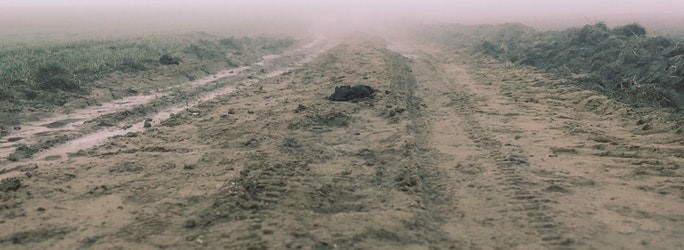This article is written after a week of very wet Autumn weather bringing with it more road safety hazards than normal. With wet weather and the darker days leading to less visibility, now is a good time for farmers to be reminded of their potential liability for leaving mud and other materials on public roads. With many farmers still undertaking potato and vegetable harvesting and others carrying out other ongoing agricultural work, the movement of heavy self-propelled harvesters and tractors with trailers and ploughs can cause field entrances to become boggy, and when the vehicles make their way from fields onto adjacent public roads they will likely bring mud with them. Farmers should take care not to incur any liability under the law.
What does the law say?
Under the Roads (Scotland) Act 1984, a person who (1) is in charge of a vehicle on a road, (2) allows such quantity of “mud, clay, farmyard manure, or other material (of whatever nature)” from the vehicle, or from anything carried on the vehicle, to drop onto or be deposited on the road which would create or be likely to create a danger or substantial inconvenience to road users, and (3) fails to remove the material as soon as reasonably practicable, commits an offence.
A road is defined as any “way” (other than a waterway) over which there is a public right of passage and includes the road’s verge and any bridge (permanent or temporary) over which, or tunnel through which, the road passes.
The definition of “vehicle” is particularly wide and includes “a machine or implement of any kind drawn or propelled along roads (whether or not by mechanical power)” and anything “towed or pushed by a vehicle and any appliance”. This would include practically any agricultural vehicle or item of machinery.
Who is in charge?
The answer may not be as straightforward as you would think. If you engage contractors to do work, you are quite likely to still be the one responsible, because it is not just the driver who is in charge as far as the law is concerned. The definition is broad and can include the owner, a person who has the immediate charge or control of the vehicle, or the person who, being present at the time, is entitled “to give orders” to the person physically in control. That extends liability of people who instruct employees or contractors to carry out work involving vehicles using roads.
Be mindful
Mud or debris left on the road can still incur liability even when not caused by vehicles, so, if you have a blocked ditch or drain that causes run-off onto the road, or you move livestock along a road, the same care should be taken.
If you do not clear the road, then the road’s authority, usually the local Council, is entitled to do so, in which case they can reclaim the expense incurred from the person who commits the offence.
In addition to the statutory offence of failing to remove agricultural materials deposited on roads, mud on the road makes for hazardous driving conditions for members of the public. Mud or other materials left on roads can potentially cause traffic accidents, which might lead to civil claims for personal injury, damage to property or death against the party responsible. Given the known risk, failing to take the necessary action in respect of deposits on roads could be considered negligent on the part of the person responsible. The consequences, financial and otherwise, for such claims are likely to be considerably more than fines imposed under a criminal conviction.
5 key steps to help you avoid liability:
- Plan – Think about mud ahead of time. Make sure that you have organised the appropriate labour and equipment including cleaning equipment and road signs, making sure the equipment is suitable for the soil and weather conditions. Employees and contractors should be given clear instructions. Having a documented procedure which employees and contractors understand will help make sure things are dealt with properly. If you are instructing a contractor, agree with them ahead of time who is responsible for mud on the road issues, such as placement of signage and cleaning.
- Warn – Erect appropriate signage to warn road users of potentially dangerous driving conditions until the road has been cleaned up. Position signs where they will be clearly seen by drivers. The local Council’s roads department or local police should be able to advise you on which signs are suitable and where and when these should be positioned.
- Clean – Try to clean as much mud as possible form the vehicles before they are taken on the roads. For the mud and muck that does reach the road, clean up the road as necessary during the working day and always at the end of the working day. It may be prudent to drive along the road yourself to make sure the surface is safe.
- Document – Keep a record of your risk assessments and of your decision making, for example your rationale behind a decision about whether you should or shouldn’t clean up or erect signage. Document the steps you have taken to clear the road. This documentation could help you to defend a claim after an incident.
- Insure – Protect yourself by making sure you have comprehensive public liability insurance in place. Many providers include liability for mud on the roads within their standard public liability policies, but it’s a good idea to check as policies can vary.
Being proactive now is your best chance of protecting others and avoiding additional stress, worry and expense in the long run. If you would like further information, please get in touch with our Land and Rural Business team.


